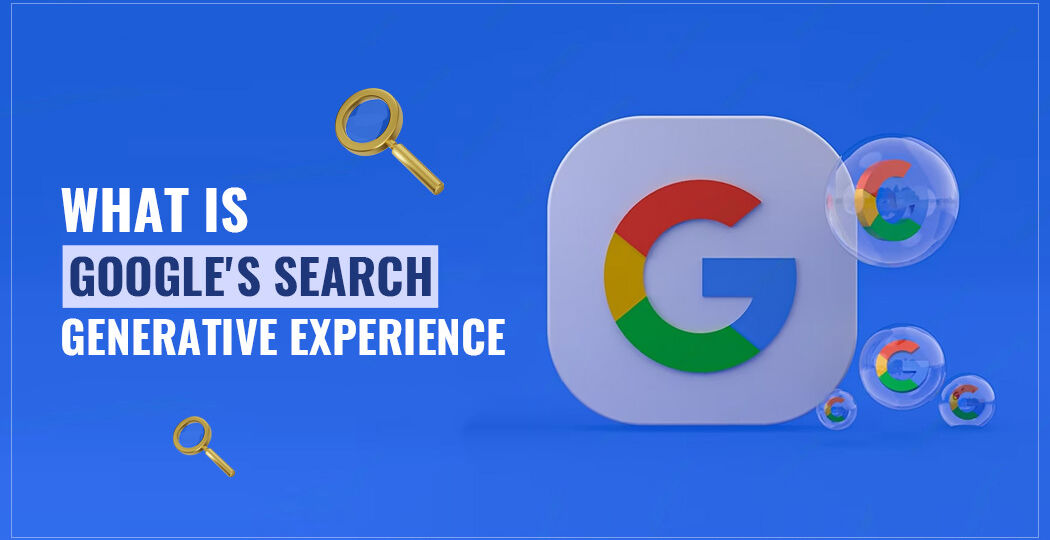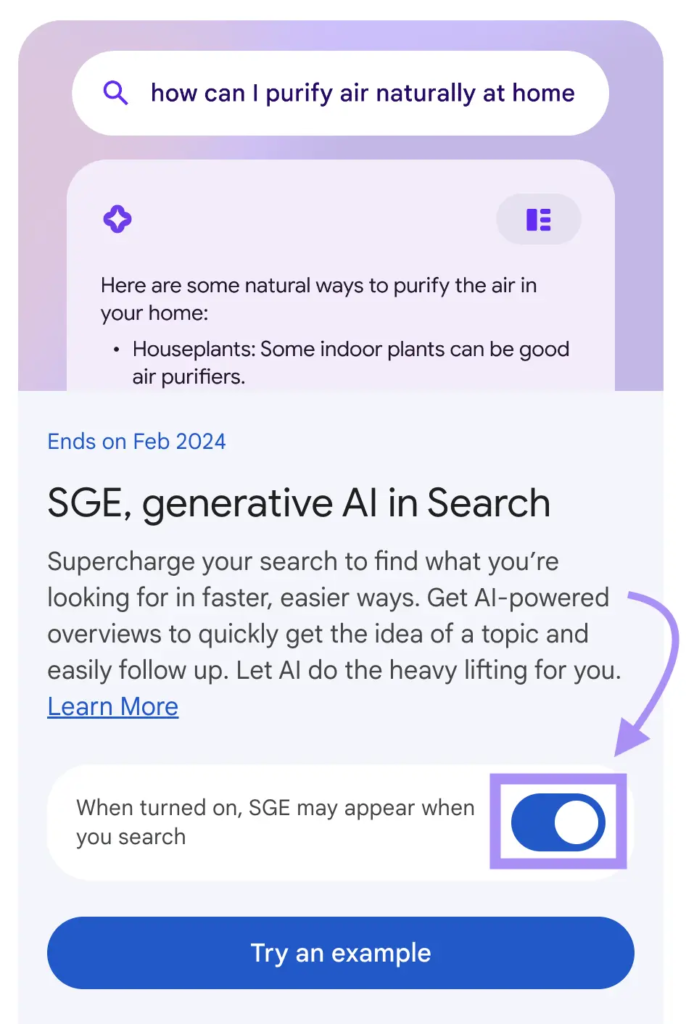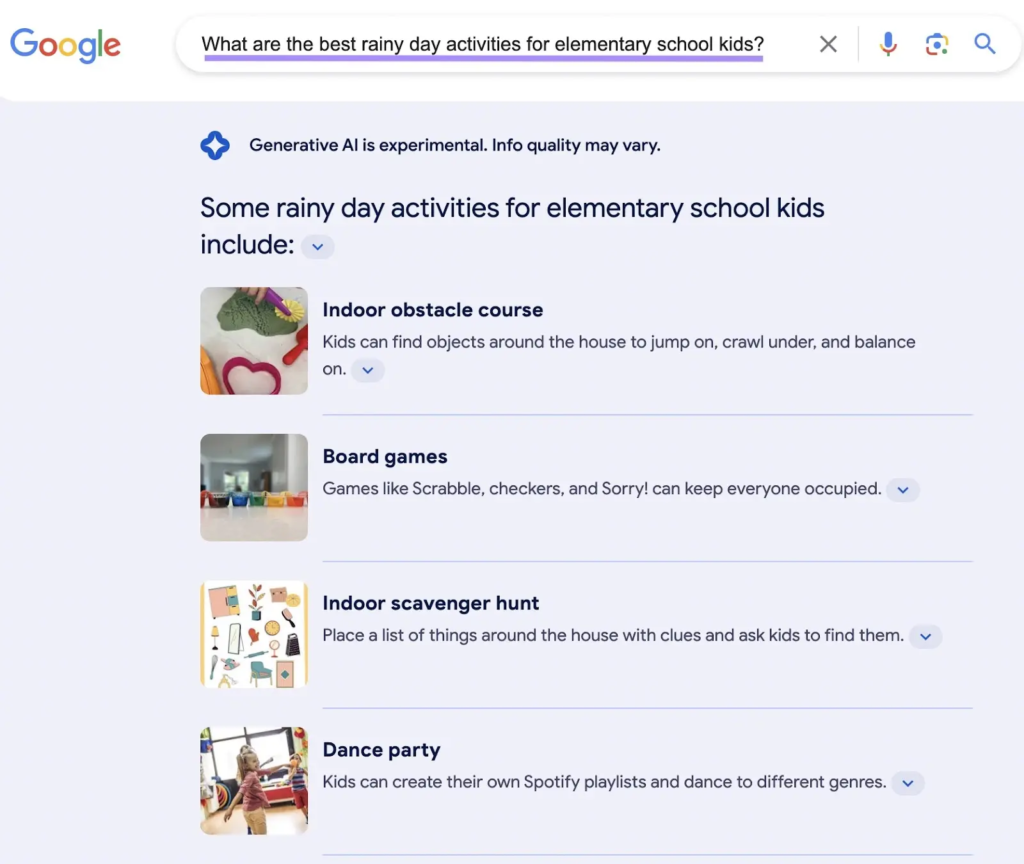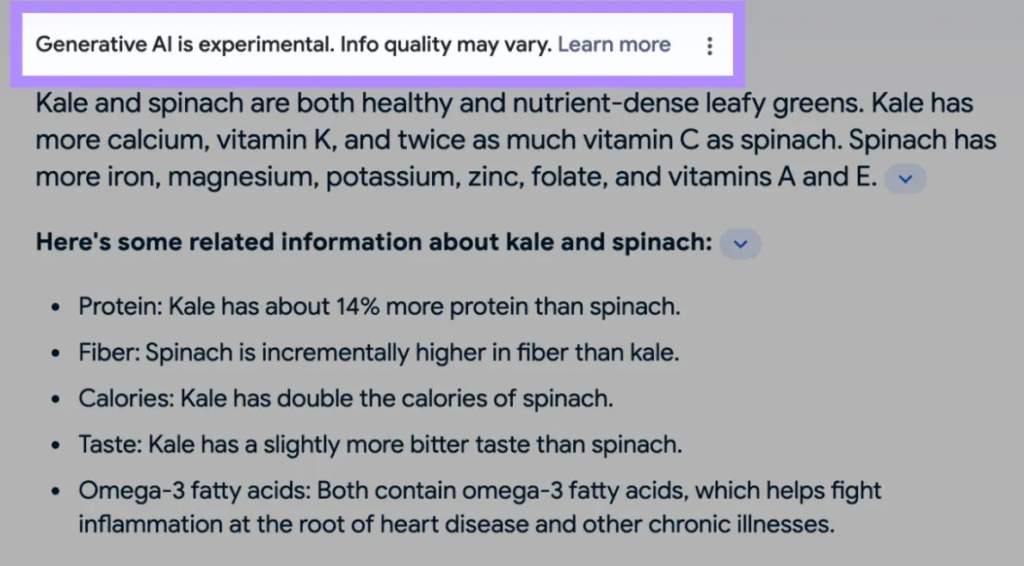
Introduction
In the ever-changing world of search engines, Google remains at the forefront, constantly innovating to enrich user interactions. One such advancement is Google’s Search Generative Experience (SGE). This cutting-edge technology represents a significant leap forward in the way users interact with search results, leveraging the power of artificial intelligence to deliver more personalized and contextually relevant information. Understanding Google SGE and its implications is crucial for both users and businesses navigating the digital realm. This is an experiment running on Google’s search lab using generative AI known as search genrative experience – SGE.
How to Enable Google SGE
Enabling Google SGE is a straightforward process that allows users to access its full suite of features. This user guide will help you to know how to use Google search generative experience. To utilize Google generative AI search, you need to have a Google Account and a Chrome browser. Google SGE is currently an experimental feature, so you need to opt in to use it.
You can activate Google SGE by signing in to your Google Account on Chrome, opening a new tab and navigating to Google, selecting the “Labs” icon at the top right of the page.

Then click the toggle icon on the “SGE, google generative AI Search” card.

Understanding Google SGE Mechanics
At its core, Google SGE operates using cutting-edge generative artificial intelligence principles. It relies on google’s advanced algorithms to create customized search results based on individual user preferences. By analyzing how users behave, their search habits, and the context of their queries, Google AI search can offer highly personalized search experiences in real time.
Google SGE combines various AI technologies, including machine learning, deep learning, and natural language processing, to understand user queries, process relevant information, and deliver suitable responses. For instance, if someone looks up “best chocolate chip cookie recipe,” Google SGE would use these technologies to showcase several recipes and provide a brief overview of each.

Advantages of Google’s Generative AI Search
The adoption of Google SGE brings numerous advantages for both users and businesses. For users, Google SGE provides a more intuitive and immersive search experience, allowing for quicker access to relevant information and resources. By using the power of generative AI, Google SGE known as Google AI chat, can surface content that may not have been readily apparent through traditional search methods, leading to greater discovery and exploration.
From a business perspective, Google Search Experience opens doors to increased visibility and engagement. By understanding user intent and delivering personalized search results, businesses can better connect with their target audience and drive conversions. Moreover, Google SGE’s predictive nature empowers businesses to foresee user requirements, allowing them to tailor marketing strategies effectively, nurturing deeper customer relationships and loyalty.
Google AI search provides a search experience that’s more engaging than the traditional method. It streamlines the process of gathering information, making it easier for users to find what they’re looking for. For instance, if you’re searching for activities for elementary school kids on a rainy day, artificial intelligence Google compiles a list of suggestions from multiple sources and displays it at the top of the search results.


Exploring Potential Drawbacks
While Google SGE offers many advantages, it is not without its challenges. One potential drawback is the reliance on AI algorithms, which may not always accurately interpret user intent or context. This can lead to instances of irrelevant or misleading search results, frustrating users and undermining trust in the platform. Secondly, Genrative AI does not apply to answer queries related to E-commerce websites or tool-based. It does not impact social media marketing or Google ads services, however, SEO practices will evolve more after this genrative search experience.
Additionally, there are concerns surrounding privacy and data security, as Google SGE relies heavily on user data to generate personalized search experiences. Critics argue that this level of data collection raises ethical questions and could potentially compromise user privacy if not handled appropriately.

Comparison with Similar AI-Powered Tools
Google SGE stands out among other AI-powered search tools due to its extensive dataset, advanced algorithms, and seamless integration with the broader Google ecosystem. Compared to Bing Chat, Google SGE shows significantly fewer links in its AI answers. Usually, Google SGE shows links in carousels only from the websites it gathers information from.
Implications for SEO
The introduction of Google SGE changes SEO strategies. It emphasizes personalized searches and relevance, so businesses must adjust their SEO tactics. This includes improving content for specific search queries, using structured data markup, and focusing on user engagement. Generative AI offers new ways to create content for SEO. Marketers can now make unique and appealing content for their audience.
Optimizing Content for Generative AI
To maximize visibility and relevance in the age of Google Search Experience, content creators and marketers must focus on creating high-quality, contextually rich content that resonates with their target audience. This may include crafting compelling narratives, incorporating relevant keywords and phrases, and optimizing content for voice search queries.
Preparing for the Future
As Google SGE continues to evolve and expand its capabilities, businesses must stay ahead of the curve to remain competitive in the digital landscape. This entails embracing emerging technologies, staying informed about industry trends, and continually refining SEO strategies to adapt to changing user behaviours and preferences.
Conclusion
In conclusion, Google SGE represents a significant advancement in the field of search engine technology, offering users a more personalized and intuitive search experience. By leveraging the power of generative AI, Google SGE has the potential to revolutionize the way we access and interact with information online. Businesses that embrace Google SGE and adapt their SEO strategies accordingly stand to gain a competitive edge in the digital marketplace.
FAQs
Google SGE, or Google’s Search Generative Experience, is an advanced search technology powered by artificial intelligence. It leverages machine learning algorithms to deliver personalized and contextually relevant search results to users based on their individual preferences and behaviour.
Unlike traditional search engines, which rely on keyword matching and indexing, Google SGE utilizes generative AI to interpret user intent and contextually generate search results. This allows for a more intuitive and personalized search experience, with results tailored to the user’s specific needs and interests.
While Google SGE may influence how search results are presented to users, it does not directly impact website rankings in the traditional sense. However, businesses that optimize their content for Google SGE may see increased visibility and engagement, which could indirectly affect their rankings over time.
As of now, Google does not provide a direct option to disable Google SGE. Once enabled, Google SGE operates in the background to enhance the search experience for users. However, users can choose to opt out of personalized search features within their Google account settings if desired.
Businesses can leverage Google SGE for marketing by optimizing their online presence to align with the platform’s algorithms. This may involve creating high-quality, contextually relevant content, incorporating relevant keywords and phrases, and focusing on user engagement metrics. By understanding and adapting to the mechanics of Google SGE, businesses can enhance their visibility and connect with their target audience more effectively.

